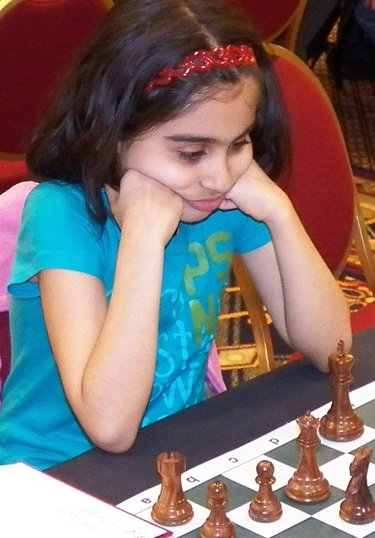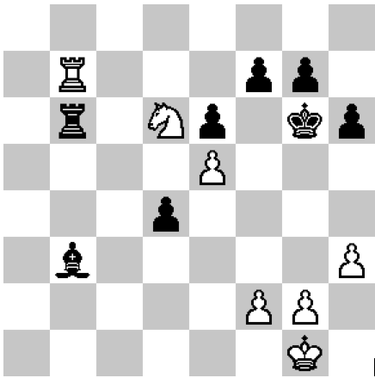Nine-year-old plays world-class chess
At 9, Martha Samadashvili dreams of becoming a world chess champion.
She is working hard to reach her goal.
In August, Martha won the North American Youth Championship for girls under 10, and was awarded the title of Woman Candidate Master.
In December, Maratha will lead the nine girls from the United States who will compete among the 134 girls in the under-10 section of the 2013 World Youth Championships. The competition, with thousands of chess players from around the world will take place in Al Ain, United Arab Emirates.
The fourth-grader from Albany’s Eagle Point School has a simple answer to the question why she likes chess: “Chess is beautiful,” she says.
Although Martha has only been playing chess for a little more than two years, she has made incredibly rapid progress, especially in the last six months. Although both her parents, Zaza Samadashvili and Nino Tsitskishvili, were active club players in their native Georgia, they had not played chess after they moved to the United States in 2002.
Martha learned how to play when her grandmother came for a visit; and noticed that Martha had a natural aptitude for the game.
Martha started playing chess at school, and soon was defeating the teacher who organized the school club. She started playing in the scholastic tournaments run by Make the Right Move, which, under the leadership of Brother John McManus, has introduced hundreds of Capital District schoolchildren to chess in the last few years. Brother John, seeing Martha’s early success, encouraged her to play in the stronger rated tournaments, including rated tournaments where children are encouraged to face adult competition.
So far this year, Martha has played in 135 chess games rated by the United States Chess Federation, and has achieved a number of startling successes. In April, she placed sixth in the All-Girl National Championship (under 10) in Chicago.
As recently as June, she was still rated under 1600, but brought a USCF rating of 1677 to the New York State Championship over Labor Day weekend, and, after playing in weekend tournaments in Binghamton, Hartford, Boston, Washington, and Atlantic City in the last two months, now is rated 1823, which should place her in the top 15 players under 10 in the United States (and among the top three girls under 10 and the top 15 girls under 13).
She has an impressive and growing number of victories over players rated over 2000: she has defeated 2012 Albany club Champion Dean Howard. While I was lucky to win my game against her in the State championship, she has beaten me twice in unrated tournaments at the Hudson River Coffeehouse.
Unlike many young players, Martha is a serious and very self-disciplined tournament player. She is very comfortable sitting at the board, does not take extended breaks when it is not her move, and is able to sit through the rigors of a three- to four-hour game without resorting to caffeine.
She also works very hard at chess: She is taking daily lessons via Skype from the respected Georgian chess coach Parmen Gelazonia. In addition to chess, she also plays the piano. Her favorite subjects in school are science and math.
She considers herself to be a tactical, rather than a positional player, and her favorite players are former world Champion Emanuel Lasker and the almost-forgotten Akiba Rubinstein (who were both active in the early 20th Century), and Bobby Fischer, whom she particularly admires because of his ability to “trade his bad pieces for his opponent’s good pieces.”
Her coach is helping her prepare openings for the upcoming world youth championships but Martha asked me not to reveal anything about her opening preparation in this article, because it might be read by her prospective opponents.
Not surprisingly, Martha’s parents strongly support her chess activities. Her father Zaza, was a doctor in Georgia. After obtaining two masters degrees in public health, he now works as a research scientist for the State University of New York. He has also started playing in tournaments, and has achieved a rating of 1689.
Martha told me that she hopes to someday become the world champion. In the short run, she is hoping to place in the top three in the World Youth Championships next month.
Although she does not yet have a FIDE (Fédération internationale des échecs) rating, her USCF rating indicates that she has a reasonable chance of winning the tournament, especially since she seems to improve almost daily, and may very well be significantly stronger than her current rating when the tournament takes place a month from now.
Help send Martha to the World Youth Championship
It is an expensive proposition to travel to the UAE for a tournament of this nature. Although the USCF has nominated Martha to represent the United States, there are no funds available to help with the costs incurred, including airfare, hotel accommodations, and FIDE and tournament registration fees.
The East Greenbush chess club is sponsoring a fundraising tournament in Albany this Saturday, Nov, 16 (details in the Community Calendar section from the Nov. 7 edition online at www.altamontenterprise.com and at eastgreenbushchessclub.org).
There is also a website, www.gofundme.com, which explains the goal of raising $3000, has a personal appeal from Martha, and which is set up to accept on-line contributions.
This week’s problem
In the third round of the 2013 New York State championship, Martha had Black against Michael Semel, a downstate player who, like many strong Class A players, was once an Expert.
Semel, perhaps feeling overconfident because he was playing a 9-year-old girl rated 1677, essayed the Morra Gambit, where White sacrifices a pawn for an attack. The gambit is considered unsound and is usually only tried against presumably weaker players.
As late as move 25, Semel was still trying to play overly aggressively, in order to avoid giving up a draw to Martha. After his final error, 31 Rb7?, Martha ends the game quickly. How?




